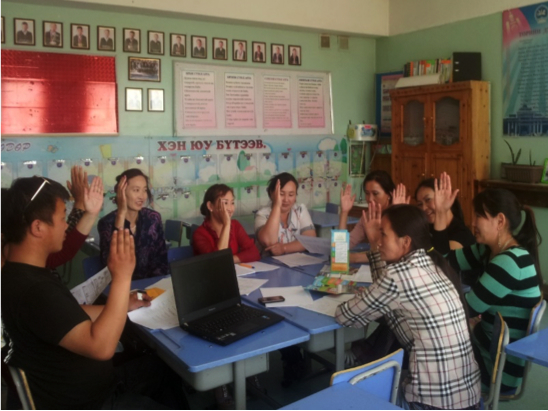
Transparency and Accountability in Mongolia Education (TAME) was a PTF-supported project that sought to strengthen civic engagement in budgeting and procurement processes to improve transparency and improve public education services in western and central Mongolia.
In recent years, Mongolia has become one of the fastest-growing economies in Asia. However, there are serious challenges, particularly in the education sector, that need to be addressed before the country can be on a sustainable economic growth path. Educational outcomes need to be improved across the board in order to prepare students with critical skills to effectively participate in the labor market. Rural areas are especially disadvantaged and suffer from disparities in access to education, particularly in geographically isolated regions. Furthermore, relevant government authorities have limited data available on education performance and budgets from provincial and district levels.
Globe International Center, an organization with close to 20 years of experience working on governance issues, was awarded a GPSA grant in January 2018 to improve the quality of service delivery in the education sector by strengthening citizen engagement in the monitoring of budgets and procurement processes in order to ensure transparency and accountability. Main activities of the project included:
- forming Parent Teacher Associations (PTAs) and training them to apply social accountability tools to monitor school performance at the district level;
- strengthening the capacity of CSOs and media to monitor budgets and procurement processes in the education sector in eight targeted provinces; and
- capturing knowledge from implementation and lessons learned to inform education reform in Mongolia and other countries around the world.
Overall, TAME created a collaborative problem-solving space where key education stakeholders—especially parents and teachers, school administrators and staff, government officials, and CSOs—could engage in discussions to improve educational service delivery through increased civic participation and enhanced transparency of budgeting and procurement processes. To that end, 31 first-time PTAs proved to be a critical mechanism for strengthening school governance and accountability in Mongolia. As shown by the consistently strong performance on budget and procurement monitoring, aimag-level CSOs have also contributed to making citizens more informed about education budgets and procurement processes at nand have empowered them to hold public authorities and their services to account.
The project also achieved some unintended outcomes and impacts, all of which were positive, including:
- An emerging role for PTAs as a channel for school-wide grievance redress. With increased recognition at school level, some PTAs have received concerns and complaints regarding issues, such as school violence and the limited transparency of school funds management by principals. To strengthen this new role, the national PTA coalition of four Ulaanbaatar-based members and seven local PTA representatives will establish a mechanism and develop guidelines for receiving, reviewing, monitoring, and resolving grievances in a timely and professional manner.
- Increase in student enrollment. The project school in Bugat soum witnessed increased enrollment as a result of the PTA’s efforts to promote awareness of their activities among the residents of neighboring bags (brigades) and to significantly improve the learning environment. Previously, recruiting new students was challenging, as a number of local parents chose to send their children to urban schools, either in the Bulgan aimag center or in the neighboring Erdenet City. However, following the announcement of a new school building and dormitory and the PTA’s collaboration with governors in the neighboring bags, 18 new students enrolled in Bugat soum school in 2018.
- A new collaborative initiative by Bulgan aimag ECD to found a coalition of education stakeholders. The coalition includes the aimag governor (chairperson), parent representatives, ECD officers, CSOs, and other relevant stakeholders. One of its immediate priorities is to set up PTAs in kindergartens, as ECD observation of PTAs indicated that earlier engagement of parents in PTA activities would enhance PTAs’ effectiveness in changing parents’ behaviors and mindsets regarding their role in their children’s learning.
Read more in the TAME Project’s Implementation Completion Report.
CHANGE STORIES
“Before the PTA, only teachers were responsible for children’s learning success, now that perception is changing and parents’ participation and support are increasing. Especially, I’m very grateful that the participation of fathers is increasing.”
– School teacher
“PTAs monitored hygiene and safety of the dormitory foods and introduced food preparation and delivery process to check food safety in the dormitory. A monitoring team does regular checks on food container, lunch and kitchen. They give recommendations to correct the faults identified and recheck. The results are shared with the PTA and reported to the director. Depending on the seasons, types of campaigns differ. For example, in the spring, a campaign to clean the school field is organized while in the winter one-week campaign to remove ice from the school environment is held.”
– PTA Representative
“The urgent issues at the schools, including providing water bottles, repairing the classroom doors and windows and improving insulation of the windows, were solved. Regular maintenance of the school facilities is ensured.”
– PTA Representative
“Now parents and teachers are able to monitor school budget expenditure and its spending so they can be more critical when the school collects money from the students. Once the school is financed with respect to its students’ number. Now, the Department of Education considers the activities undertaken in each school when they approve the budget. It is a significant change that was brought by the project.”
– Local NGO Representative

